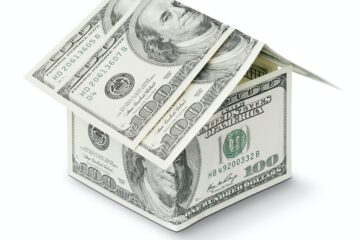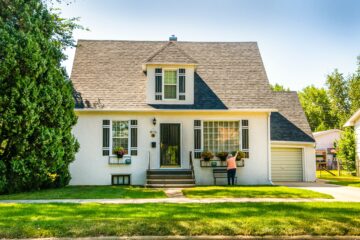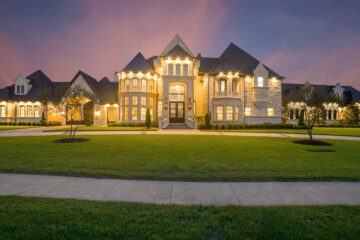One of the financial positions that most of us want to be in one day is the position of being able to pay off our house. But then we NEED to ask ourselves the question, should I pay off my house? Because, the answer might be yes. And the answer might be no. Let me explain.
When You SHOULD Pay Off Your House
To be clear, I am talking about either a lump sum (like an inheritance, extremely large bonus, lottery winning, etc.) OR a scenario where you pay off your house over a period of time aggressively. Either one.
At the end of the day you have to decide where your dollars should be put to use in the most efficient manner.
However, at the same time, you need to do what is in your best interest. And even if it is not the most efficient use of their dollars to pay off your house, I have known people who simply need to be rid of the mortgage to sleep better at night and to have peace in their life.
If that is you, then go for it. You have my blessing. But with one caveat.
You must read the rest of this article before you make that decision. Especially if you are younger.
Paying off your house early can be a great decision for one person and cost another person hundreds of thousands (if not millions) of dollars in opportunity cost.
Scenario #1
If you are within 10 years of retirement, I argue that you should focus on paying down your mortgage aggressively.
Why?
If you follow what I have been teaching and you have been saving 20-25% of your income toward retirement, have paid off your consumer debt, purchased reasonable cars, have purchased a reasonable home, and do not carry credit card debt then you are in a good place to start paying down the mortgage aggressively.
I want you to go into retirement with no debt if possible.
However, if you find yourself behind on saving for retirement then maybe focus on catching up your retirement savings instead of paying down your house.
You don’t want to go into retirement with a huge mortgage and a bunch of retirement income. Nor do you want to go into retirement with little savings and no mortgage.
Should I pay off my house? If you are within 10 years of retirement and have a good nest egg built up, then yes. But do not stop saving for retirement or your other needs/wants in life. Just allocate any extra money toward paying off the mortgage before you retire.
Scenario #2
Some people have a debt aversion more than others. And that is okay. Some people simply do not sleep well at night knowing that they owe others money, even if it is on their mortgage.
If you are one of those people that is okay. You have my blessing to pay off your mortgage early.
HOWEVER…
Do not pay your mortgage down before you pay your other debts off. Make sure that you do not have credit cards, car loans, payday loans, student loans, etc. Only pay off your mortgage AFTER those have been paid off.
And understand this. If you decide to pay your mortgage off early, you will likely miss out on a LOT of compounding growth in the future that that money could have earned had it been invested instead of applied to your mortgage.
If you can swallow that pill. Go for it.
But let me show you how much it costs you to pay off your mortgage early.
The Opportunity Cost of Paying Off My House Early
Opportunity cost is a fancy way of saying what you will lose out on if you make a decision.
For example, you have $100 and want to spend it at Home Depot or go out to a nice dinner but can only do one.
If you decide to go out to a nice dinner then the opportunity cost is not going to Home Depot.
Should I pay off my house early? Well it depends on the opportunity cost.
If you decide to allocate your dollars to your mortgage instead of investing those dollars then the opportunity cost is the money you could have made in the investments.
Here’s how much that can cost you.
Let’s take Michael as an example. Michael is 25 and owns a home and has recently come into a large chunk of money.
He owes $300,000 on his home at a 5% interest rate and just inherited $300,000.
For the sake of simplicity, he can either pay off his mortgage or invest that money.
If Michael decides to pay off his home, he will essentially make 5% on his “investment” by not having to pay the interest on it anymore.
Even if Michael were to then invest his mortgage payment (about $1,610/month) that he no longer has, he would end up with about $675,000 at the end of 30 years.
But if he invests that money then he would likely make 10% (the average S&P 500 return over the last 30 years) he would have a LOT more money at the end.
He would have about $5.2 million at the end of the 30 years!
Here is a chart of what it looks like to pay off a $300,000 mortgage early with a lump sum at various ages:
| Age | Money if You Pay Off Your Mortgage First and Then Invest Your Mortgage Payment | Money if You Invest the Inheritance and Pay Off Your Mortgage Normally |
| 25 | $675,000 | $5,234,000 |
| 30 | $548,000 | $3,250,000 |
| 35 | $427,000 | $2,018,000 |
| 40 | $312,000 | $1,253,000 |
| 45 | $203,000 | $778,000 |
| 50 | $99,000 | $483,000 |
So if you decide that you want to pay off your mortgage early because it makes you feel better and helps you be more at peace with your financial situation, that is cool.
But just understand that it will come at a cost.
Final Thoughts
I’m not here to tell you what to do. I’m simply here to help give you the tools and knowledge to make a good informed decision.
But should I pay off my house early? That is up to you but if you do, just understand that it will cost your future self.
You can do this!
I am here for you!
Until next time!



0 Comments